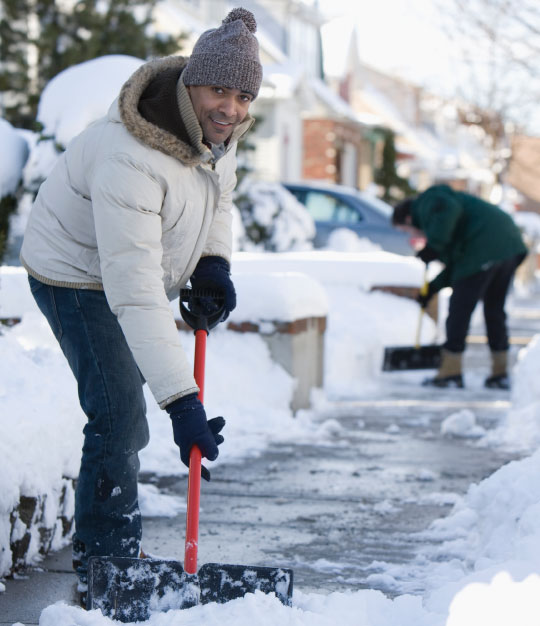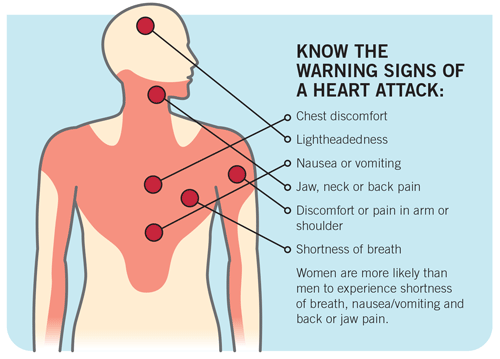
Read this before you shovel snow.
Winter is prime time for heart attacks, as research studies show and doctors know all too well. “It’s expected in the hospital community that we’ll see a bump in the number of heart attacks coming in during the winter season, especially around the holidays and during the first couple of months of the year,” says Isaac Tawfik, MD, Chief of Cardiology at Monmouth Medical Center and a member of RWJBarnabas Health Medical Group.

“It’s been theorized that if your core temperature is lower because you’re outside and not really bundled up, the body’s natural response is for arteries to vasoconstrict, or to narrow,” Dr. Tawfik explains. “If somebody already has a narrowing or blockage in the artery, it’s going to interfere with normal blood flow, and that’s the definition of a heart attack.”
Ruptured plaque is another main culprit for heart attacks in cold weather, he says. “Any exertional work that’s heavy and not gradual, like shoveling snow, puts stress on coronary arteries. If those arteries have plaque, it may crack or rupture, which can lead to a whole cascade of platelet aggregation and other inflammatory mediators that eventually lead to a heart attack.”
In winter, middle-aged patients—people in their 40s, 50s, 60s—may be more prone to heart attacks than seniors. “They feel that they’re healthy enough for shoveling snow and other types of outdoor exertion, so they don’t warm up first and may not wear warm enough clothing,” Dr. Tawfik says.
Unlike older patients, they may be unaware of their limitations, he notes, and may not understand the possible consequences of existing conditions, such as hypertension, uncontrolled diabetes or tobacco use. The risk of a heart attack increases with every additional risk factor a person has.
“All of this is not to say that shoveling snow is automatically going to give you a heart attack,” says Dr. Tawfik. “What we are saying is that if you have known heart disease, or one or more risk factors for heart disease, you should think carefully before going out to shovel snow.”
Safeguard Your Heart
How can people protect themselves against heart attacks in cold weather? “Number one, make sure you speak to your doctor so that any risk factors you have are addressed—if you have hypertension, that your blood pressure is well controlled, if you are diabetic, that your blood sugar is under control, if you are a smoker, that you are working on a cessation plan,” says Dr. Tawfik.
Stay warm when you’re outside and take frequent breaks to go inside and assess how you feel. “If you’re breathing in cold air, it cools your chest a little bit. You don’t necessarily have the burning in the chest that can be a symptom until you go inside,” he says. “Do the work in short intervals so you’re not outside for hours at a time.”
Be aware of anything different in the way you feel. “A heart attack symptom doesn’t have to be chest pain, because not everybody gets that. If you’re nauseous, or if you’re more fatigued or breathless than you expected to be, those can be red flags,” he says.
Dr. Tawfik shows his patients images that illustrate their cardiovascular condition—an X-ray, an ultrasound, a CT scan—as a means of helping them grasp their risks. “If I have a patient who’s 60 years old and I can tell him his risk for heart disease in the next 10 years is X versus someone who didn’t have those risk factors, they tend to be more compliant,” he says.
Dr. Tawfik advises his patients to consult their primary care physician or cardiologist before undertaking any high-effort physical activity in cold weather. “It’s like driving your car and putting a seat belt on,” he says. “It’s always best to err on the side of safety.”

Know the Warning Signs of a Heart Attack
- Chest discomfort
- Lightheadedness
- Nausea or vomiting
- Jaw, neck or back pain
- Discomfort or pain in arm or shoulder
- Shortness of breath
- Women are more likely than men to experience shortness of breath, nausea/vomiting and back or jaw pain.
How Cold Weather Affects the Heart
- Low temperatures cause blood vessels and arteries to narrow.
- Blood flow is restricted and the delivery of oxygen to the heart is reduced.
- The heart must pump harder to circulate blood through the constricted blood vessels.
- As a result, blood pressure and heart rate increase.
- A sudden spike in blood pressure, especially when combined with exertion such as shoveling, can lead to heart attack or stroke.
- Narrowing of or stress on coronary arteries may lead to plaque rupture and blood clots that block blood flow to the heart.
- Hypothermia—when body temperature drops below 95 degrees Fahrenheit—affects the workings of the heart, nervous system and other organs.
Whoever your heart beats for, our hearts beat for you. Connect with a top cardiovascular specialist at RWJBarnabas Health by calling 1-888-724-7123 or view Heart and Vascular Care.